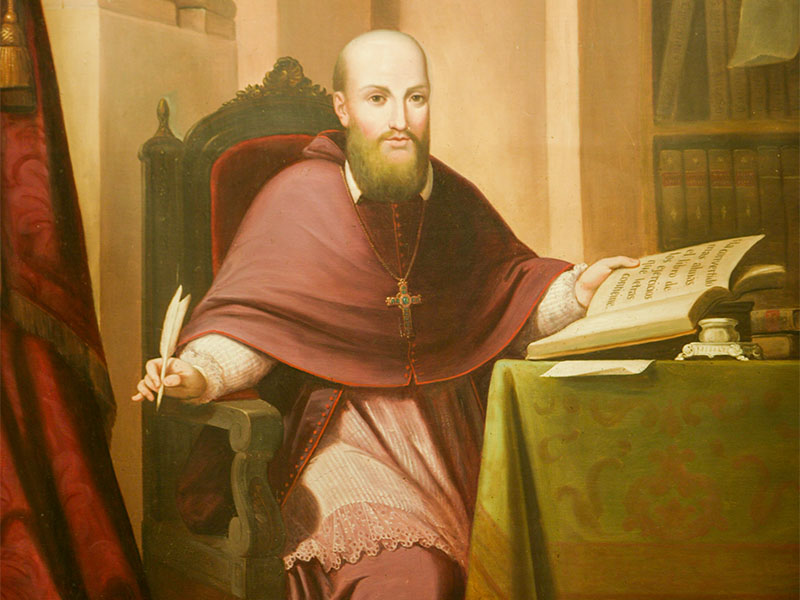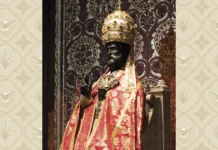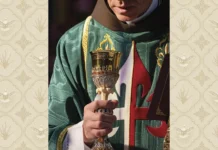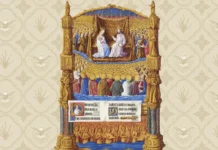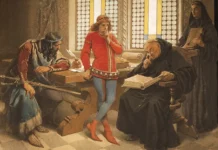By his example, St. Francis de Sales points the way for those who spread the Catholic Faith through the press. In the month of his liturgical memorial, in which we also celebrate this magazine’s anniversary, we recall the words of Pius XI in declaring him the patron Saint of Catholic writers.
We now have the joy to celebrate the Third Centenary of the entrance into Heaven of another great Saint, remarkable not only for his sublime holiness of life but also for the wisdom with which he directed souls in the ways of sanctity. This Saint was no less a person than Francis de Sales, Bishop of Geneva and Doctor of the Universal Church. […]
He arises as one sent by God to oppose the heresies of the Reformation, which gave rise to mankind’s apostasy from the Church, the sad and disastrous effects of which are presently deplored by every honest mind. […]
Truly meek and humble of heart
Endowed with every virtue, he excelled in meekness of heart, a virtue so peculiar to himself that it might be considered his most characteristic trait. His meekness, however, differed altogether from that artificial gentility which consists merely in polished manners and in the display of a conventional affability. It differed, too, both from the apathy which nothing moves and from the timidity which does not dare to become indignant, even when indignation is required.
This virtue, springing from the heart of de Sales as the sweet fruit of charity, and nourished by the spirit of compassion and forbearance, so tempered the gravity of his demeanour and so evinced itself in his voice and gestures, that he won from all the most loving reverence. Well known are his readiness to welcome and his kindness in attending to one and all, particularly the sinners and apostates who flocked to his house to be reconciled with God and to amend their lives. […]
When, but a year after his priestly ordination, despite his father’s opposition, he offered himself to gain the reconciliation of the dwellers of Chablais with the Church, and was joyfully received by Granier, Bishop of Geneva, he demonstrated great zeal, avoiding no labour and fleeing no danger, even that of death. He profited more, in the obtainment of the conversion of millions, by his unalterable sweetness in the performance of the diverse functions of sacred ministry, than by his eminent doctrine and vigorous eloquence […]
The great strength of will of this model of meekness manifested itself whenever he was compelled to confront the powerful in order to protect the interests of God, the dignity of the Church, or the salvation of souls. […]
Writings that point to the path of perfection
Let us now see, Venerable Brothers, how St. Francis, himself such a loving model of holiness, showed to others by his writings the sure and easy path to Christian perfection – in this also imitating Christ, who “began to do and to teach.” (Acts 1:1) To this end, he published many works, among which we may single out his two best known books, Philothea – An Introduction to the Devout Life, and Treatise on the Love of God. […]
Although we must pass silently over many writings of St. Francis in which “that heavenly doctrine which, like a stream of living water, flowed so as to favour the salvation of God’s people,”1 We cannot fail to speak of his work entitled Controversy, in which unquestionably there is to be found a “full and complete demonstration of the truth of the Catholic Religion.”2
A new style of evangelization
The circumstances surrounding the mission of St. Francis to La Chablais are well known to you, Venerable Brothers, for when, towards the close of 1593, as we learn from history, the Duke of Savoy concluded a truce with the inhabitants of Berne and Geneva, nothing was thought more efficacious to reconcile the population to the Church than to send them zealous and learned preachers who, through eloquent persuasion, would gradually win them back to the Catholic Faith. However, the first missionary sent soon deserted the field of battle, either for despairing of the conversion of these heretics or fear of facing them.
But St. Francis de Sales who, as stated, offered himself for missionary work to the Bishop of Geneva, started on foot in September, 1594, without food or money, and accompanied solely by a cousin of his. Only after long and repeated fasts and prayers to God, by whose aid alone he hoped for success in his mission, did he attempt to enter the country of the heretics.
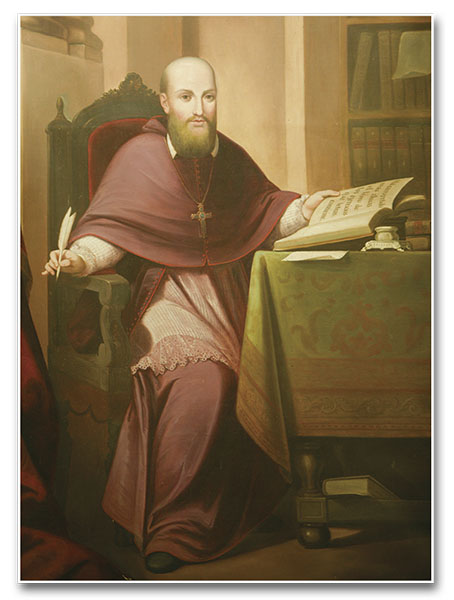
When they eschewed his sermons, he decided to refute their erroneous doctrines by means of loose leaflets which he wrote in the intervals between his sermons, and which were distributed in great quantities and passed from hand to hand, until finding their way into the possession of the heretics. […]
Truly admirable is the doctrinal structure and the arguments which he wisely marshalled like troops in orderly array, so as to attack his adversaries and defeat all their lies and fallacies with subtle and polished irony.
His words at times appear to be somewhat strong, but as even his opponents admitted, his writings always breathed a spirit of charity which was always the regulating force of his disputes. […]
Thus, it is not surprising that, by his intervention, such a great number of heretics should have returned to the Church and that, following his instruction and guidance, so many of the faithful attained, in the last three centuries, a high degree of perfection.
An example to be imitated
It is Our wish that the greatest fruits should be gained from this solemn Centenary by those Catholics who as journalists and writers expound, spread, and defend the doctrines of the Church. In their polemics, they must imitate and exhibit at all times that strength joined always to that moderation and charity so characteristic of St. Francis. By his example, he teaches them clearly how they should write.
In the first place, let writers study and learn the teachings of the Church to the best of their ability; let them never compromise where the truth is involved, nor, out of fear of offending an opponent, minimize or dissimulate it. They ought to excel for their literary style and try to express their thoughts clearly and in beautiful language so that their readers will be drawn to the truth. When it is necessary to enter into controversy, let them refute error and overcome the wiles of the wicked, but always in a way that demonstrates clearly that they do so motivated by the highest principles and above all by Christian charity.
Since St. Francis, up to this time, has not been named the Patron of Writers in any solemn and public document of this Apostolic See, We take this happy occasion, after mature deliberation and in full knowledge, by Our Apostolic authority, to hereby publish, confirm and declare by this encyclical, everything to the contrary notwithstanding, St. Francis de Sales, Bishop of Geneva and Doctor of the Church, to be the Heavenly Patron of all Writers. ◊
Excerpts from: PIUS XI.
Rerum omnium perturbationem:
AAS 15 (1923), 51-61
Notes
1 PIUS IX. Dives in misericordia.
2 Idem, ibidem.


